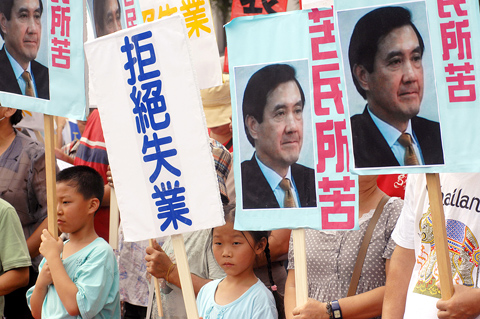Dozens of unemployed people and their children staged a demonstration on Ketagalan Boulevard in front of the Presidential Office yesterday, urging President Ma Ying-jeou (馬英九) and his administration to help the jobless find employment.
“Being jobless is not just a problem for the unemployed worker, it also affects their circle of friends and their families,” Hsiao Chung-han (蕭忠漢) of the Association for Rights of the Unemployed told the demonstrators, many of whom held placards showing images of Ma above the words “feel the pain of the people.”
Huang Yao-hung (黃耀宏), 58, was one of the protesters.

PHOTO: AFP
Huang, from Taichung, used to work for a machinery manufacturer, but lost his job when the company moved its factory to China several years ago.
“Now I only work low-paying part-time jobs, but I have five kids to feed — all college students,” Huang said, adding that he needed to spend more than NT$100,000 on tuition fees for his children twice a year.
“All I want is for the government to help me find a stable job,” he said.
Another protester, Liao Mei-jung (廖美蓉), whose husband was laid off when Chunghwa Telecom was privatized several years ago, agreed.
“Social welfare resources should be spent on taking care of those who can’t work,” Liao said. “Since we’re still capable of working, providing job opportunities for us should be the priority.”
Aside from economic pressure, she said, “the psychological pressure [of being jobless] is the most troubling.”
In addition to offering help with finding stable employment, the demonstrators said the president should fulfill his campaign promise of extending the period of time an unemployed person is eligible to receive unemployment benefits from six months to one year.
They urged Ma to set up an unemployment rights commission under the Presidential Office “to periodically check employment promotion policies,” Hsiao said.
The demonstrators’ request to meet officials from the Presidential Office was not met yesterday as it was a weekend day.

A strong continental cold air mass is to bring pollutants to Taiwan from tomorrow, the Ministry of Environment said today, as it issued an “orange” air quality alert for most of the country. All of Taiwan except for Hualien and Taitung counties is to be under an “orange” air quality alert tomorrow, indicating air quality that is unhealthy for sensitive groups. In China, areas from Shandong to Shanghai have been enveloped in haze since Saturday, the ministry said in a news release. Yesterday, hourly concentrations of PM2.5 in these areas ranged from 65 to 160 micrograms per cubic meter (mg/m³), and pollutants were

Taiwan’s armed forces have established response protocols for a wide range of sudden contingencies, including the “Wan Chun Plan” to protect the head of state, the Ministry of Defense (MND) said today. After US President Donald Trump on Saturday launched a series of airstrikes in Venezuela and kidnapped Venezuelan President Nicolas Maduro, concerns have been raised as to whether China would launch a similar “decapitation strike” on Taiwan. The armed forces regularly coordinate with relevant agencies and practice drills to ensure preparedness for a wide range of scenarios, Vice Minister of National Defense Hsu Szu-chien (徐斯儉) told reporters before a

EVA Airways on Saturday said that it had suspended a pilot and opened an investigation after he allegedly lost his temper and punched the first officer several times as their plane was taxiing before takeoff at Los Angeles International Airport. According to a report published on Thursday by The Reporter, the incident occurred after the flight’s Malaysian first officer tried to warn the Taiwanese pilot, surnamed Wen (文), that he was taxiing faster than the speed limit of 30 knots (55.6kph). After alerting the pilot several times without response, the first officer manually applied the brakes in accordance with standard operating

NOT AN OPENING: Trump’s violation of international law does not affect China’s consideration in attacking Taiwan; Beijing lacks capability, not precedent, an official said Taiwanese officials see the US’ capture of the president of Venezuela as a powerful deterrent to Beijing’s aggression and a timely reminder of the US’ ability to defeat militaries equipped with Chinese-made weapons. The strikes that toppled Venezuelan President Nicolas Maduro signaled to authoritarian leaders, including Chinese President Xi Jinping (習近平), US President Donald Trump’s willingness to use military might for international affairs core to US interests, one senior official in Taipei’s security circle said. That reassured Taiwan, the person said. Taipei has also dismissed the idea that Trump’s apparent violation of international law could embolden Beijing, said the official, who was not